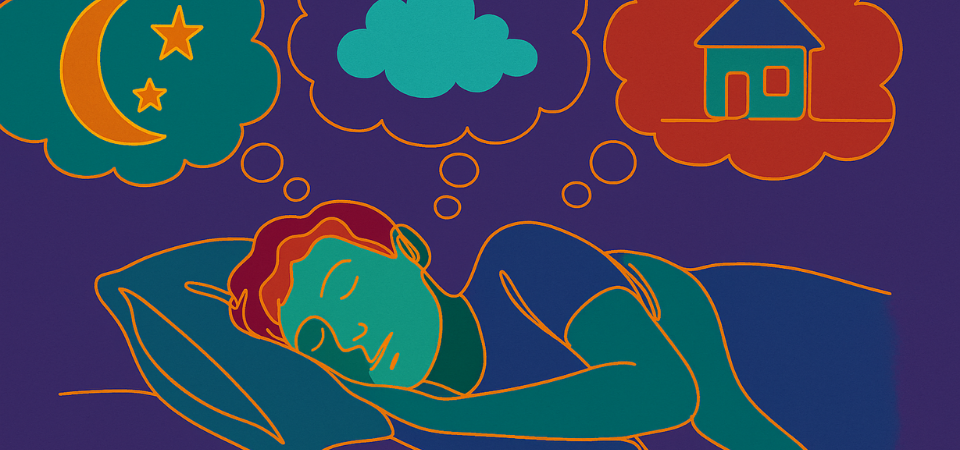What really happens inside your brain during sleep

Sleep researchers have uncovered something remarkable: your brain doesn't simply "turn off" when you drift into deep sleep. Instead, it orchestrates a sophisticated energy redistribution that keeps you connected to the world while your mind repairs itself.
Using cutting-edge imaging technology, scientists at Mass General Brigham tracked exactly how the brain manages its resources during NREM (non-rapid eye movement) sleep — the deep, restorative phase that accounts for roughly 75% of your nightly rest. What they found challenges the common assumption that sleep means uniform brain shutdown.
How Your Sleeping Brain Stays Alert to Danger
The study, published in Nature Communications, reveals a fascinating division of labor during deep sleep. While areas responsible for complex thinking, memory consolidation, and daydreaming significantly reduce their energy consumption, regions that process movement and sensory information maintain surprisingly high activity levels.
This selective energy management explains why you can sleep through familiar sounds like air conditioning or traffic, yet instantly wake to a crying baby or smoke alarm. Your brain essentially maintains a security system — keeping sensory networks powered while allowing cognitive centers to rest and repair.
"This research helps explain how the brain stays responsive to the outside world even as awareness fades during sleep," said lead researcher Jingyuan Chen, PhD, from the Martinos Center for Biomedical Imaging at Massachusetts General Hospital.
The implications extend far beyond academic curiosity. Understanding this energy flow helps explain why poor sleep quality affects cognitive performance so dramatically, and why certain sleep disorders can leave people feeling mentally foggy despite spending adequate time in bed.
Revolutionary Imaging Reveals Sleep's Hidden Mechanics
The research team used an unprecedented tri-modal approach, combining EEG brain wave monitoring, fMRI blood flow analysis, and PET scans to track glucose metabolism in real-time. This allowed them to observe 23 healthy adults as they naturally fell asleep during brief afternoon sessions.
The results painted a detailed picture of sleep's metabolic choreography. As participants transitioned into deeper NREM stages, overall brain energy consumption decreased — but not uniformly. Blood flow became more dynamic, particularly in sensory processing areas, while higher-order cognitive networks powered down significantly.
Perhaps most intriguingly, the researchers observed increased cerebrospinal fluid flow during deep sleep. This finding supports growing evidence that sleep serves as the brain's waste management system, clearing metabolic toxins that accumulate during waking hours — including proteins associated with Alzheimer's disease and other neurodegenerative conditions.
What This Means for Your Sleep Quality and Brain Health
These findings offer practical insights for optimizing both sleep and cognitive performance. The research suggests that quality deep sleep requires more than just time in bed — it demands the right conditions for your brain's energy redistribution system to function properly.
Environmental factors that interfere with sensory processing during sleep — such as irregular noise, temperature fluctuations, or light pollution — may disrupt this delicate energy balance. This could explain why some people feel unrested despite adequate sleep duration, and why sleep quality often matters more than quantity for cognitive function.
The study also reinforces the importance of NREM sleep for long-term brain health. Since this phase appears crucial for waste clearance and neural maintenance, anything that fragments or reduces deep sleep could potentially accelerate cognitive decline over time.
For athletes and high-performers, these insights highlight why sleep optimization should be considered as important as nutrition or training. The brain's ability to maintain alertness while conducting essential maintenance during deep sleep directly impacts next-day focus, reaction time, and decision-making capacity.
Where Sleep Science Is Heading Next
While these findings represent a significant advance in understanding sleep's neurological mechanisms, researchers acknowledge important limitations. The study involved only 23 participants during brief afternoon naps, which may not fully represent nighttime sleep patterns or individual variations in sleep architecture.
Future research plans include larger, more diverse study groups and longer sleep recordings that capture complete sleep cycles. Scientists also aim to develop more precise methods for measuring brain metabolism and better distinguish between different sleep stages.
The team is particularly interested in how these energy patterns might differ in people with sleep disorders, neurodegenerative diseases, or cognitive impairments. Understanding these variations could lead to more targeted treatments for sleep-related health issues.
The research underscores a fundamental truth about human biology: even in our most restful state, the brain remains an active, sophisticated system balancing competing demands for energy, maintenance, and vigilance. Rather than viewing sleep as downtime, we might better understand it as a carefully orchestrated state of selective consciousness — one that's essential for both immediate performance and long-term brain health.



